Rookies who aren’t really rookies (from left): Carlton’s Eddie Betts, Brisbane’s Grant Birchall and the Giants’ Shane Mumford.
Eddie Betts is finally an AFL rookie – at the end of his grand football career.
Betts is now 34. He turns 35 next November when he is expected to farewell the AFL fields while some teenagers prepare to be drafted for their start-up rookie seasons in the big league.
Betts will play his 17th AFL season in 2021. He will add to his 331 games split between Carlton and Adelaide. The resume includes representing the AFL (in 2010) when the league presents itself as “Australia” in a make-believe code of mixed football in “Tests” with the Irish Gaelic representatives.
Betts has three All-Australian honours (2015, 2016 and 2017, when he was also leading the Adelaide goalkicking list for four consecutive seasons after arriving as a free agent in 2014).
He has kicked the AFL “goal of the year” four times – 2006 with Carlton and 2015, 2016 and 2019 when Eddie was putting his name on every pocket at Adelaide Oval while becoming a crowd favourite for the Crows’ faithful.
Not bad for a “rookie” who already has on his trophy cabinet the 2005 award as Carlton’s best first-year player.
Forget trying to explain the holding-the-ball rule to your international relatives and friends; now there is also this “rookie” dilemma. Where else but in the AFL could a sporting organisation take the “rookie” theme from one extreme to the other?
Rookie, as the rest of the world and every other sport in Australia knows it, draws this definition: “A rookie is a person in the first year of activity in a sport.”
That is not Eddie Betts.
It is not Collingwood premiership defender Tyson Goldsack, who after being forced to sit out 2020 by the COVID pandemic complicating his move to Port Adelaide as its SANFL captain, returns to the AFL as a 165-game “rookie”.
This is where Port Adelaide is jumping through two loopholes – by rookie-listing Goldsack, the club eases some of his salary as a development coach from the AFL’s tighter soft cap on football-department spending; and it also overcomes SANFL eligibility rules to allow Cam Sutcliffe and Goldsack to both play in the state league next season.
The other great “comeback” is at North Melbourne, with former Richmond defender Connor Menadue being re-baptised as a “rookie” after being delisted in 2019 with 39 AFL games to his name.
Four-time premiership winner Grant Birchall enters his 16th season – and second at Brisbane after a stellar career at Hawthorn – as a rookie.
Same theme with Jarrod Harbrow, who was drafted as a genuine rookie in 2007 by the Western Bulldogs – and returns to that category on the Gold Coast list next season when he intends to add to his 258 national league matches.
But there is no way anyone can define Greater Western Sydney ruckman Shane Mumford as a rookie. He has a premiership at Sydney in 2012, a 201-game record at Geelong, Sydney and GWS … and he is presented by the AFL as a rookie? Surely not.
Nor David Mackay, who next year will defy his critics in the Crows fan base for the 14th consecutive AFL season – as a rookie-listed player at Adelaide.
There is even a “phantom rookie” next season – at Adelaide, who with the No.1 pick in the recent rookie draft assigned the tag to the 2006 national No.1 draftee, Bryce Gibbs.
Gibbs stays on Adelaide’s list – while preparing to play for South Adelaide in the SANFL next season – to cover salary cap requirements associated with the pay-out (around $400,000, two-thirds of his original contract value for 2021) on the deal he took from Carlton to the Crows in 2018.
Betts will have existed on an AFL list as a pre-season draftee (pick No.3 in 2004). He will have been on the “primary” or “senior list” at both Carlton and Adelaide. And he will finish as a rookie at Carlton.
Surely, it should be as a “veteran”? But it can’t be. This category went at the end of 2016, two years after the AFL put the clubs on notice of changes to list-management themes.
The AFL Players’ Association argued the scrapping of the veterans category from AFL lists would strip clubs of the incentive to keep seasoned stars in the game – and deny teams the positive influence from the league’s wise old men. Club cultures would be weakened, the AFLPA insisted.
Gone was the mechanism – introduced during the 1990s – to gain salary cap relief for keeping players aged at least 30 and with a minimum of 10 years’ experience on a club’s list.
But in 2021, there is a marvellous loophole with the rookie list.
Clubs such as Carlton with Betts and Port Adelaide with Goldsack can each place two veterans on the “rookie list” and put $80,000 of their salaries outside the new salary cap of $13.1 million (down nine per cent on the 2020 count of $14.5 million).
Betts isn’t even a groundbreaker in this list-management anomaly. Carlton worked the same theme in 2014 with 33-year-old Heath Scotland, who was delisted by the Blues and redrafted as a “rookie”, lasting just four games before a degenerative ankle problem forced his exit in May.
Like Betts, Scotland was more suited to a “veteran” description than “rookie”.
For some time, the AFL has tripped itself with labels on AFL lists – “primary”, “rookie” and “category B rookie”, that includes the internationals. In 2021, a clean-up is more than appropriate.
The AFL introduced the rookie category (that should have been labelled as “supplementary”) in 1997 when the national league expanded to 16 with the rise of Port Adelaide from the SANFL State league.
Teenagers who were overlooked in the draft were given the chance to be part of an AFL system, in the hope of being late bloomers – and there were many success stories under this theme. Dean Cox at West Coast is probably the dux of the original rookie academy.
PLEASE HELP US CONTINUE TO THRIVE BY BECOMING AN OFFICIAL FOOTYOLOGY PATRON. JUST CLICK THIS LINK.
Or another Eagle – pick No.31 in the 2005 AFL rookie draft and future (2014) Brownlow Medallist, hard-running midfielder Matt Priddis.
Adelaide used the rookie list to advance Ben Rutten, Martin Mattner and Nathan Bock. Aaron Sandilands at Fremantle was another as clubs followed the Cox model of letting young ruckmen develop on the rookie list – a concept that worked for Port Adelaide with Dean Brogan while he reverted to Australian football from basketball; Sam Jacobs after he fled Carlton to join Adelaide; Mark Jamar and Mumford.
Even a Collingwood premiership captain – Nick Maxwell – had to find his way from a rookie list.
But the latest version of rookie lists highlights that the AFL hierarchy came out of its exhaustive Collective Bargaining Agreement talks with the players’ union not thinking clearly.
Where was the office clerk to remind AFL football boss Steven Hocking that the theme of “rookies” did not fit with veterans such as Betts, Mumford, Mackay and Goldsack? Of course, those anonymous members of the AFL staff were cut in May with the COVID squeeze.
The original rookie in the AFL was aged 18-23 … and could not play an AFL game unless there was a long-term injury to a “senior” player on the “primary” list.
This system of putting young players on minimum pay but asking them to work the full program at AFL club – with no promise of playing a big league match – did develop one major critic. Inaugural Adelaide coach Graham Cornes labelled the original rookie format – the one that gave untried AFL footballers an “apprenticeship” in the big league – as a “rip off”.
“It is a system that exploits the desire of a young footballer to make the big time – at any cost,” Cornes said in 2017. “The club’s recruiters could also take a hit for not having the confidence to draft the players on to the senior list … but as they are trying to work within the framework of a flawed system, we can excuse them.
“A quick look over the recent rookie lists in recent years highlights just how delinquent the recruiters have been identifying talent worthy of selection on an AFL list.
“(The 2016) Norm Smith medallist, Jason Johannisen came off a rookie list, as did his premiership teammates Luke Dahlhaus, Matthew Boyd and Dale Morris.
“If you go back further, West Coast champion, Dean Cox was initially a rookie. His team-mate, Brownlow medallist, Matt Priddis was one also. Brett Kirk, Aaron Sandilands and Stephen Milne are all 200-plus gamers who were rookies.
“Of course, most of the rookies are discarded after a year, maybe two of battling to balance a working life and impressing their AFL coaches.”
The AFL adjusted the qualification rule for rookies in 2006 to remove the 23-year age limit – but still demanded that the rookie had never previously played in the league. At the same time, the rookie class was expanded to “internationals”, although the league originally excluded Gaelic footballers from Ireland. Now there were category A and category B rookies, but at least they were still untried AFL players.
This concept probably collapsed in 2006, too. The AFL created the precedent – for good reason – that year, when it allowed Adam Ramanauskas to remain on Essendon’s list while he won his battle with cancer.
The rookie theme completely changed in 2018, when the AFL allowed rookies to be selected for matches from the start of a season, rather than wait for a long-term injury to open up a spot. The rule had been tinkered with earlier, allowing clubs to upgrade a rookie for a senior player after a mid-season cut-off date.
And now virtually anyone – even a 300-game veteran such as Betts – can be a “rookie” and play AFL games from the start of a season.
It is time to clear up yet another mess created at AFL House with multiple conflicting agendas. As categories, “primary”, “supplementary” and “veteran” would do.
Then someone can work on a list – the top-10 players to start as rookies, true rookies. And then a top-10 list of veterans who finished as rookies.
Madness. Total madness, that again highlights the AFL again being trapped by rolling agendas and compromises, either with clubs or the powerful player union. And there also are the pot-holes created by list changes forced in the COVID fall-out that has cut squad sizes and the salary cap.
Someone at AFL House needs to revisit the folly of its list descriptors. Experienced players defined as rookies is just farcical.
10 GREAT (GENUINE) ROOKIES
DEAN COX
Pick No.28, 2000 rookie draft
Inducted to Australian Football Hall of Fame this year. Resume includes 290 AFL games with West Coast from 2001-2014 and six All-Australian honours. Led the rucks in West Coast’s 2006 premiership-winning campaign and won the club’s best-and-fairest award in 2008.
MATT PRIDDIS
Pick No.31, 2006 rookie draft
Priddis already had two WAFL premiership medals and the league’s Sandover Medal before he was on West Coast’s list. He finished with 240 AFL games, the Brownlow Medal in 2014 and one All-Australian jumper (2015).
BRETT KIRK
Pick No.40, 1999 rookie draft
A mature-age rookie, Kirk overcame a rocky start at Sydney to become one of the game’s toughest and most-admired players across his 241 AFL games. He served as Sydney captain, twice won the Swans’ club champion award (2005 and 2007), and was a premiership player and an All-Australian.
TADHG KENNELLY
Pick No.9, 2000 rookie draft
Part of the Irish rush to Australian football, Kennelly became the first Irish-born player to achieve AFL premiership success – with the Sydney drought-breaking flag in 2005 – while playing 197 games in two stints with the Swans (2001-2008 and 2010-2011). His return to Ireland in 2009 culminated in Gaelic championship success with Kerry.
AARON SANDILANDS
Pick No.33, 2002 rookie draft
Much like Cox at West Coast, Sandilands moved from the country districts of Western Australia and developed his ruck game in the WAFL State league before advancing from the rookie list at Fremantle. He played 271 AFL matches to 2019, achieved four All-Australian selections and two club champion titles at the Dockers.
NICK MAXWELL
Pick No.15, 2002 rookie draft
From the rookie list to the Collingwood captaincy, and skipper in the 2010 AFL premiership – this is the tale of defender Nick Maxwell across 208 games in 11 seasons with the Magpies. He also earned All-Australian selection in 2009 and repeatedly impressed with his maturity standing out in his media appearances.
MICHAEL BARLOW
Pick No.8, 2010 rookie draft
Immediately shone in 2010 when his peers named Barlow as the league’s best first-year player after being overlooked at the national draft following training runs with St Kilda and Essendon. Played 126 games with Fremantle from 2010-2016 before the midfielder moved to Gold Coast, where his 15-game run ended with a broken leg in his first season with the Suns.
MAX ROOKE
Pick No.41, 2000 rookie draft
Another of Geelong recruiting boss Stephen Wells’ diamonds in the rough, the versatile Rooke played 135 AFL games from 2002-2010 to celebrate premiership success in 2007 and 2009.
LIAM PICKEN
Pick No.30, 2009 rookie draft
Sadly forced out of the game by concussion issues, Picken was an extraordinary tagger at the start of his 198-game career with the Western Bulldogs. Then he emerged from a run-with shadow to a game-breaker, notably claiming the plaudits while driving the Bulldogs to their drought-breaking flag in 2016.
DEAN BROGAN
Pick No.26, 2000 rookie draft
The only man to have both an NBL basketball championship and AFL football premiership on a resume that records 174 AFL matches with Port Adelaide and 19 while ending his AFL career as a ruckman at Greater Western Sydney.

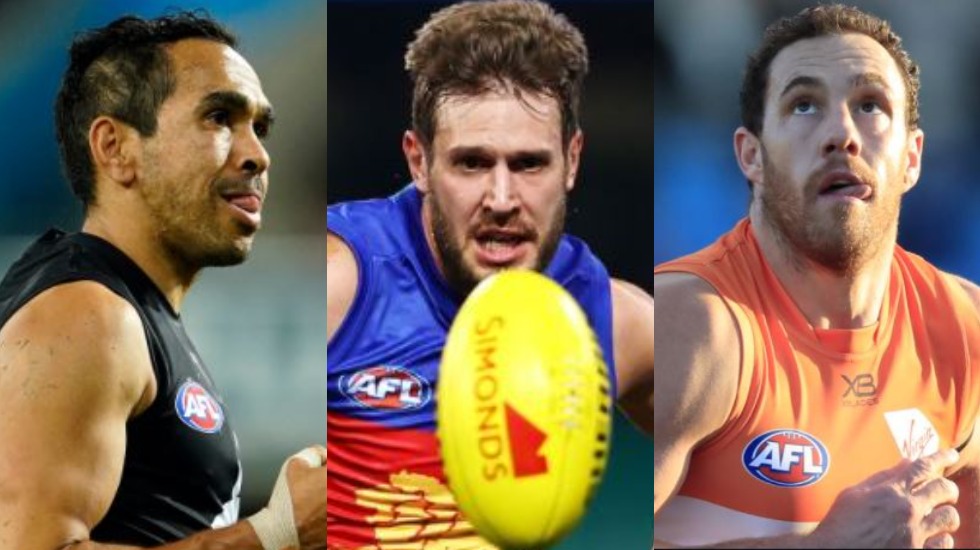

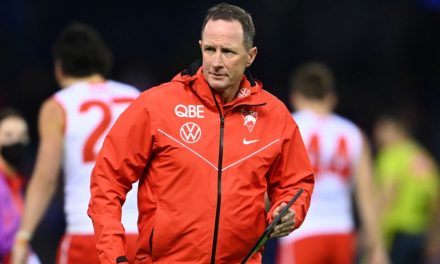
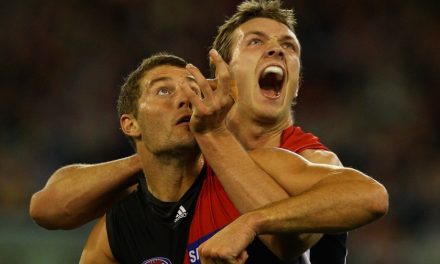
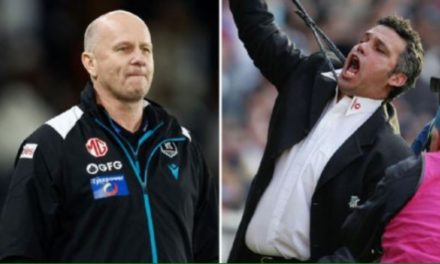
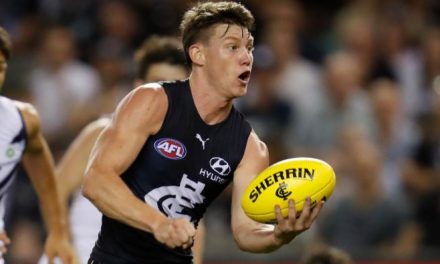






It’s a complete mess. Why does the AFL insist on getting things into such a complex situation. Having labels that bare no resemblance to what they are has got to make things more obtuse than needs be.
Brad Sewell